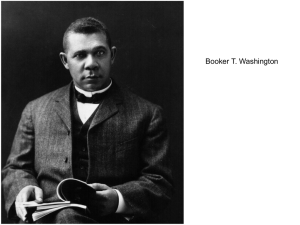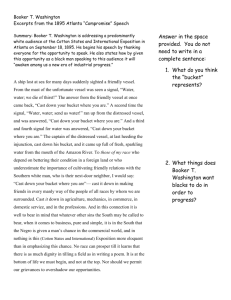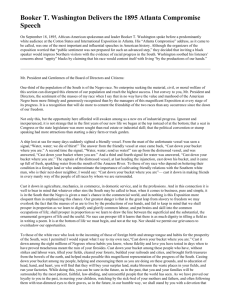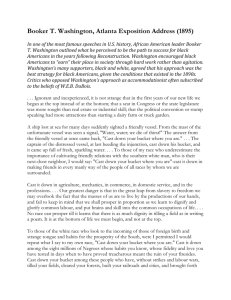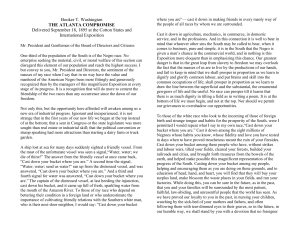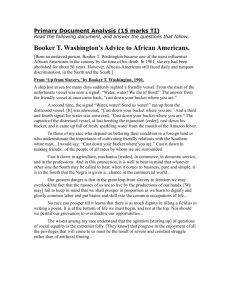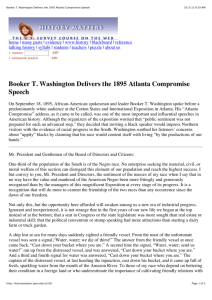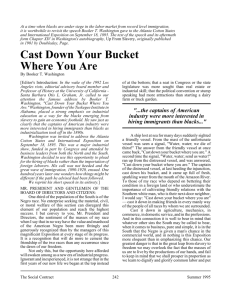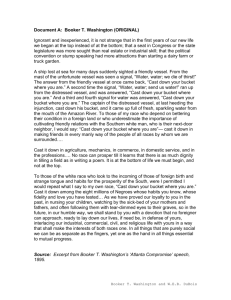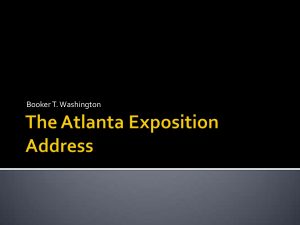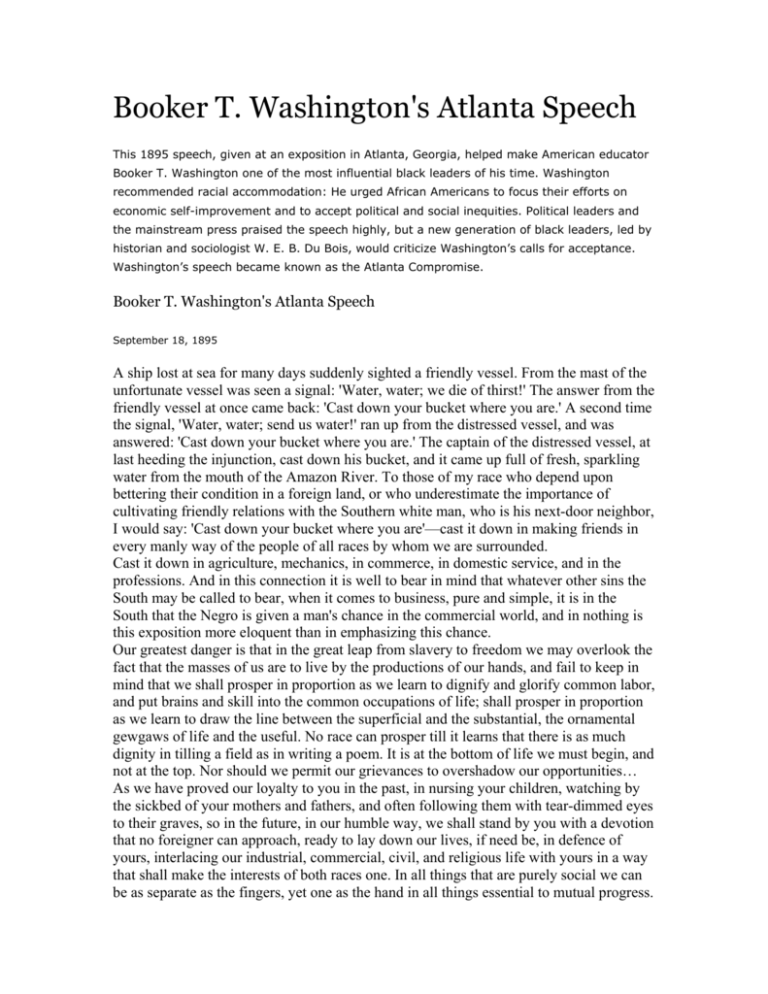
Booker T. Washington's Atlanta Speech
This 1895 speech, given at an exposition in Atlanta, Georgia, helped make American educator
Booker T. Washington one of the most influential black leaders of his time. Washington
recommended racial accommodation: He urged African Americans to focus their efforts on
economic self-improvement and to accept political and social inequities. Political leaders and
the mainstream press praised the speech highly, but a new generation of black leaders, led by
historian and sociologist W. E. B. Du Bois, would criticize Washington’s calls for acceptance.
Washington’s speech became known as the Atlanta Compromise.
Booker T. Washington's Atlanta Speech
September 18, 1895
A ship lost at sea for many days suddenly sighted a friendly vessel. From the mast of the
unfortunate vessel was seen a signal: 'Water, water; we die of thirst!' The answer from the
friendly vessel at once came back: 'Cast down your bucket where you are.' A second time
the signal, 'Water, water; send us water!' ran up from the distressed vessel, and was
answered: 'Cast down your bucket where you are.' The captain of the distressed vessel, at
last heeding the injunction, cast down his bucket, and it came up full of fresh, sparkling
water from the mouth of the Amazon River. To those of my race who depend upon
bettering their condition in a foreign land, or who underestimate the importance of
cultivating friendly relations with the Southern white man, who is his next-door neighbor,
I would say: 'Cast down your bucket where you are'—cast it down in making friends in
every manly way of the people of all races by whom we are surrounded.
Cast it down in agriculture, mechanics, in commerce, in domestic service, and in the
professions. And in this connection it is well to bear in mind that whatever other sins the
South may be called to bear, when it comes to business, pure and simple, it is in the
South that the Negro is given a man's chance in the commercial world, and in nothing is
this exposition more eloquent than in emphasizing this chance.
Our greatest danger is that in the great leap from slavery to freedom we may overlook the
fact that the masses of us are to live by the productions of our hands, and fail to keep in
mind that we shall prosper in proportion as we learn to dignify and glorify common labor,
and put brains and skill into the common occupations of life; shall prosper in proportion
as we learn to draw the line between the superficial and the substantial, the ornamental
gewgaws of life and the useful. No race can prosper till it learns that there is as much
dignity in tilling a field as in writing a poem. It is at the bottom of life we must begin, and
not at the top. Nor should we permit our grievances to overshadow our opportunities…
As we have proved our loyalty to you in the past, in nursing your children, watching by
the sickbed of your mothers and fathers, and often following them with tear-dimmed eyes
to their graves, so in the future, in our humble way, we shall stand by you with a devotion
that no foreigner can approach, ready to lay down our lives, if need be, in defence of
yours, interlacing our industrial, commercial, civil, and religious life with yours in a way
that shall make the interests of both races one. In all things that are purely social we can
be as separate as the fingers, yet one as the hand in all things essential to mutual progress.
There is no defense or security for any of us except in the highest intelligence and
development of all. If anywhere there are efforts tending to curtail the fullest growth of
the Negro, let these efforts be turned into stimulating, encouraging, and making him the
most useful and intelligent citizen. Effort or means so invested will pay a thousand per
cent interest. These efforts will be twice blessed—blessing him that gives and him that
takes…
Gentlemen of the exposition, as we present to you our humble effort at an exhibition of
our progress, you must not expect overmuch. Starting thirty years ago with ownership
here and there in a few quilts and pumpkins and chickens (gathered from miscellaneous
sources), remember the path that has led from these to the invention and production of
agricultural implements, buggies, steam engines, newspapers, books, statuary, carving,
paintings, the management of drugstores and banks, has not been trodden without contact
with thorns and thistles. While we take pride in what we exhibit as a result of our
independent efforts, we do not for a moment forget that our part in this exhibition would
fall far short of your expectations but for the constant help that has come to our
educational life, not only from the Southern states, but especially from Northern
philanthropists, who have made their gifts a constant stream of blessing and
encouragement.
The wisest among my race understand that the agitation of questions of social equality is
the extremest folly, and that progress in the enjoyment of all the privileges that will come
to us must be the result of severe and constant struggle rather than of artificial forcing.
No race that has anything to contribute to the markets of the world is long in any degree
ostracized. It is important and right that all privileges of the law be ours, but it is vastly
more important that we be prepared for the exercise of those privileges. The opportunity
to earn a dollar in a factory just now is worth infinitely more than the opportunity to
spend a dollar in an opera house.
In conclusion, may I repeat that nothing in thirty years has given us more hope and
encouragement, and drawn us so near to you of the white race, as this opportunity offered
by the exposition; and here bending, as it were, over the altar that represents the results of
the struggles of your race and mine, both starting practically empty-handed three decades
ago, I pledge that, in your effort to work out the great and intricate problem which God
has laid at the door of the South, you shall have at all times the patient, sympathetic help
of my race; only let this be constantly in mind that, while from representations in these
buildings of the products of field, of forest, of mine, of factory, letters, and art, much
good will come, yet far above and beyond material benefits will be the higher good that,
let us pray God, will come in a blotting out of sectional differences and racial animosities
and suspicions, in a determination to administer absolute justice, in a willing obedience
among all classes to the mandates of law. This, coupled with our material prosperity, will
bring into our beloved South a new heaven and a new earth.
Source: The Penguin Book of Historic Speeches. MacArthur, Brian, ed. Penguin Books,
1996.
Microsoft ® Encarta ® 2006. © 1993-2005 Microsoft Corporation. All rights reserved.


